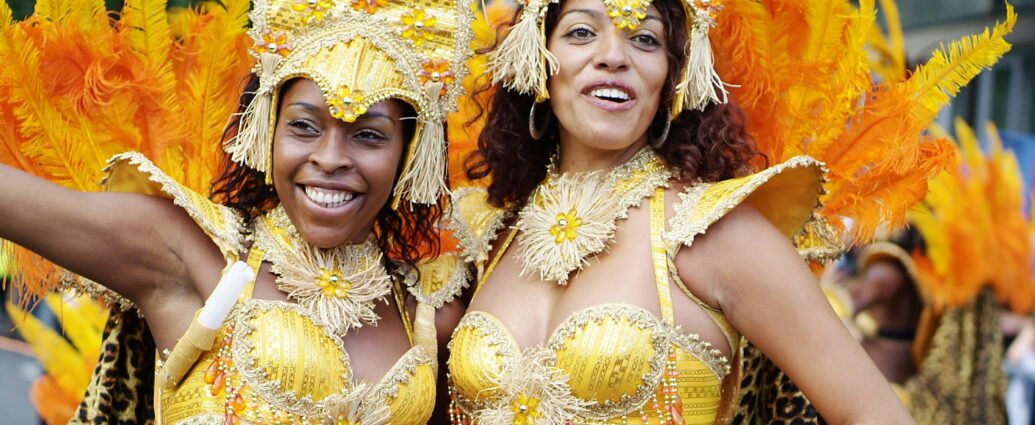Alanya Smith
Enriching British history by annually commemorating the deep roots of Caribbean culture embedded across the UK, Notting Hill Carnival is a vibrant celebration of activism and resilience in the face of adversity, hostility, and racism.
Following a two-year hiatus to accommodate the COVID-19 pandemic, Notting Hill Carnival has exploded onto the streets of London with a reignited passion and effervescence to highlight the beauty and culture building the foundations of contemporary British culture. Amassing a returning audience of over two million attendees, the event is the second largest Carnival in the world, behind Rio de Janeiro.
Carnival-goers were delighted with the vast array of dancing, music, food, and drink spotlighted, with roots in Caribbean culture. In times of celebration, it’s important to recognise the deep-rooted history of the Carnival and the importance it holds in both political discourse and honouring the activism of previous generations.
History
Kelso Cochrane aspired to become a lawyer at age 32 until he was killed in a racially motivated attack in Notting Hill. The Antiguan-born carpenter deeply moved the local community, with over 1,200 attendees at his funeral showing solidarity and ‘a show of defiance against racism’. Though allegations of a police cover-up sprung following his death, his case presently remains unsolved. In the wake of Kelso’s death, a discourse surrounding racial tension in Notting Hill was enacted in the House of Commons.
A children’s street fayre was organised through local activists uniting with the aim of resolving tensions within the local area. Lead organiser Rhaune Laslett stated: “We felt that although West Indians, Africans, and Irish and many other nationalities all live in a very congested area, there is very little communication between us. If we can infect them with a desire to participate, then this can only have good results.”
“forming a beautiful landscape for a muli-cultural community”
Through the heartfelt efforts of Rhaune and those in her community, Notting Hill Carnival was born. The fruition of Carnival evolving into an international event is now recognised as having only been possible through the support and encouragement of many people throughout history. For example, Trinidadian human rights activist Claudia Jones broadcasted Caribbean Carnival on BBC in 1959 and evolved the hunger the public had for a space to celebrate Caribbean culture. This sparked musicians to perform in the streets of Notting Hill in the 1960s, forming a beautiful landscape for a multi-cultural community to participate in through dance and self-expression.
Present Mission
Activism and local spirit continue to underscore the spirit and vibrance experienced within Carnival today, eternalised at the heart of the event and those attending. Carnival emerged from the violent death of Kelso Cochrane as a counteractive demonstration of peace, understanding and progressive action to resolve local tensions. Shift to contemporary Carnival and these values are at the core of celebration, commiseration, and commemoration.
For example, Carnival is greatly influenced by the actions of the Windrush generation, paving the opportunity for peacebuilding and change-making in modern society. In upholding the dedication and resilience which inspired the creation of the event, Carnival continues to press for recognition and further support for the Grenfell Tower fire victims, holding moments of silence for the 80 local community members who recently died.
“holds racial justice and harmony at its epicentre”
The present mission of Notting Hill Carnival holds racial justice and harmony at its epicentre, aiming to ‘deliver an event of immense value both culturally and economically’.
A vast number of iconic performers have taken to the carnival stage, including Jay Z, Lil’ Kim, Wiley, Stormzy, Stefflon Don and Giggs. Present ambassadors include Alexandra Burke, Maurisa Coleman and Levi Roots.
Creativity Through Costume
“costumes transform into couture elements”
Over 15,000 costumes are made for the event each year, emphasising the talent and skill of designers across the world. Costumes transform into couture elements which trademark Carnival and further reinforce the event as an opportunity to create and innovate through colour, material, and cultural heritage fashion. It’s estimated that over 30 million sequins are used to embellish the costumes each year!
You're welcome! Loving theee amazing pics!🎉#NHCarnivalisback https://t.co/OloUazHFdV
— Notting Hill Carnival (@NHCarnivalLDN) August 29, 2022
Recent Media Attention
In this year’s Carnival celebrations, a 21-year-old man was fatally stabbed and later died following his attendance at the event. Over 209 arrests were made by London’s Metropolitan Police, including incidents of drug and weapon possession and public order offences.
Regarding protection, Commander Dr Alison Heydari stated: “We are also working to keep the area safe with the festival organisers implementing ‘safer spaces’ where women and girls can go and seek advice from specially trained professionals, as well as the police.”
“it is imperative that the appropriate safeguarding and protection services are implemented at the event”
It is imperative that the appropriate safeguarding and protection services are implemented at the event to ensure that all those present and in a safe and protected environment. The cultural significance of Carnival sustains an environment for the celebration and positive spheres for Caribbean attendees and all diverse communities who feel welcomed and accepted in the key themes of empowerment and peacebuilding present in the event.
Presently, the closure of sites of cultural significance and community in the UK has been greater recognised through the closure of LGBTQ+ clubs following the COVID-19 pandemic. This has sparked debate on the importance of these environments in upholding safe spaces which act as institutional pillars of British culture, reflecting the diverse visibility of these spaces in the public and becoming removed from financial hardship.
To continue the phenomenal progress of past activists, Carnival must remain a platform which protects and uplifts the vibrance of Caribbean culture within British culture and heritage. The unprecedented significance of Notting Hill Carnival in British history, and its future, must not remain unrecognised.
Featured image courtesy of S Pakhrin via Flickr. Image license found here. No edits were made to this image.

